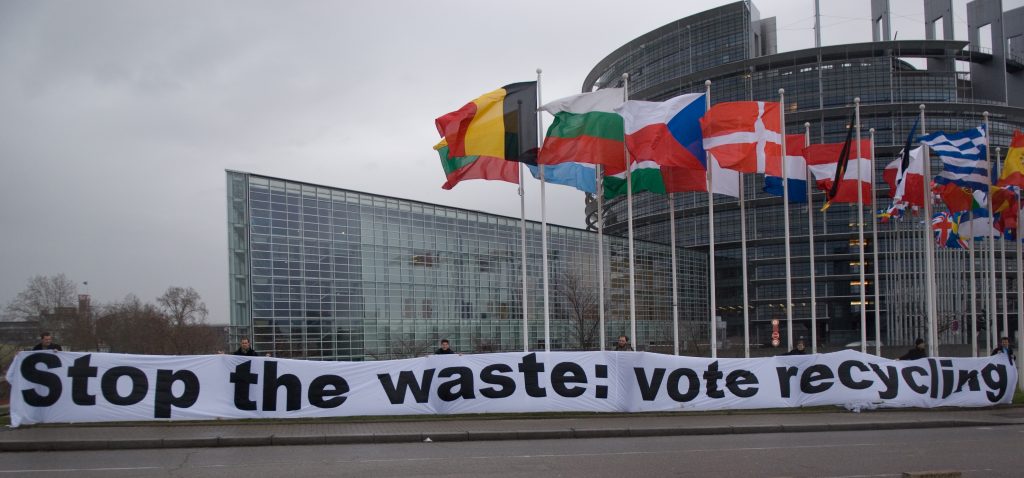Brussels, 4 June – The debate on recycling and prevention targets in the revision of the EU’s main waste directive has now entered a new stage, with a proposed deal at a third informal meeting between the Commission, Slovenian Presidency and a European Parliament delegation on Monday. The deal outlines very low and unenforceable recycling targets, postpones prevention targets and reclassifies some incineration as ‘recovery’.
Dr Michael Warhurst of Friends of the Earth Europe, said: “We live in a world under a massive climate threat and increasing pressure on resources, yet EU governments are trying to avoid making substantive commitments to prevent waste and increase recycling. We are very concerned that the Parliament’s delegation is proposing to give away too much of the Environment Committee’s strong position on this Directive. If the deal is accepted we will look back on this moment as a failure in the political will to make achievable and beneficial changes”.
Although the Environment Committee had proposed binding targets by 2020, the informal agreement calls for weaker non-mandatory targets for households, construction and demolition waste but excludes other business wastes. [1]
Parliament also voted for the EU to stabilise its waste production by 2012, but the proposed deal instead delays the setting of prevention targets to 2014, when the recycling targets would also be reviewed.
Nathalie Cliquot, EEB’s waste policy officer said: “The very low and unenforceable approach would just delay the chance to set real recycling and prevention targets. The deal must be rejected and the complete decision-making process used to establish enforceable and effective targets which match the urgency of the climate and resources threats. This early agreement does not go nearly far enough to help reduce Europe’s waste problem, not to mention the climate benefits that will now be lost.” [2]
The deal’s proposed re-branding of some incinerators as ‘recovery’ rather than ‘disposal’, ignores the evidence that incineration is a climate problem not a climate solution [3]. Incineration is also inflexible and expensive and can limit recycling rates, as reflected by Denmark’s opposition to a mandatory 50 per cent household recycling rate because they already have too many incinerators. Given the clear need for – and achievability of – higher recycling targets, Member States cannot afford to put in place such expensive and inflexible residual waste technologies.
The deal also proposes a loose definition of ‘by-products’ that will allow many materials that are currently waste to escape from the safety of waste management controls.
This proposed second reading deal will be voted on by the full Parliament in its plenary session on 16-19th June in Strasbourg.
***
NOTES TO EDITORS:
For a more detailed analysis of the review of the Waste Framework Directive, see our policy briefing and web sites:
http://www.foeeurope.org/publications/2007/FoEE_EEB_WasteBrief_Sep07.pdf
http://www.foeeurope.org/activities/waste_management/
http://www.eeb.org/activities/waste/Index.htm
[1] Parliament’s Environment Committee has proposed a binding target of 50 per cent recycling of household waste and 70 per cent of business waste by 2020. The proposed deal has an unenforceable target of 50 per cent of some streams of household waste (glass, paper, plastics, metals) and 70 per cent of construction and demolition waste, leaving other business wastes – more than 20 per cent of total waste – with no target. A 50 per cent household waste recycling target alone could save CO2 emissions equivalent to taking as much as 31 million cars off Europe’s roads.
[2]”Climate Protection Potentials of EU Recycling Targets“, Knut Sander (?kopol Gmbh), commissioned by the European Environmental Bureau and Friends of the Earth Europe. http://www.eeb.org/publication/documents/RecyclingClimateChangePotentials.pdf
The method used in the study showed that key climate benefits of recycling (including composting) are avoiding extraction and processing of materials (such as aluminium) and avoiding landfill of wastes that break down into the global warming gas methane. The study built on a UK report which found that recycling was much better for the climate than incineration.
[3] “A changing climate for energy from waste?“, Eunomia Consultants for Friends of the Earth, May 2006:
http://www.foe.co.uk/resource/reports/changing_climate.pdf
Summarised in “Dirty Truths: Incineration and Climate Change“, Friends of the Earth, May 2006:
http://www.foe.co.uk/resource/briefings/dirty_truths.pdf






